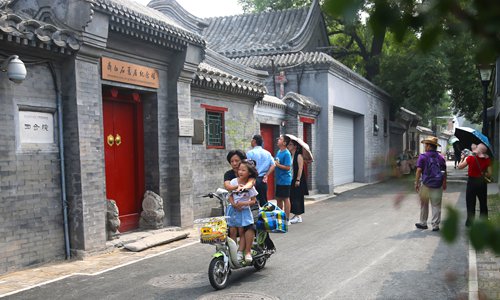HOME >> ARTS
Hong Kong documentary maker talks about building bridges with Chinese mainland
By Bi Mengying Source:Global Times Published: 2019/8/11 17:38:39

A hutong in Beijing Photo: IC

Kit Chung Photo: Courtesy of Kit Chung
In June 2018, short film studio Arrow Factory posted a short documentary titled Hongkongers in Beijing on its YouTube channel. In the documentary, six Hongkongers talked about what it's like living in Beijing."There are good things about Beijing, and there are good things about Hong Kong. Why don't we combine the good things together and make it all better?" said Liu Xiaohui, who moved to Beijing in 2003, in the video.
The roughly 13-minute-long video has more than half a million views and more than 5,000 comments. In the comments, many viewers talked about how touched they were by the video and expressed their hope for better understanding between people from Hong Kong and the mainland.
Unexpected adventure
Kit Chung, who also appeared in the documentary, is the executive producer at Arrow Factory, which was founded under the umbrella of Chinese mainland news website Jiemian.
After getting his bachelor's in filmmaking in a Taiwan based university in 2007, the young and adventurous Chung did not feel like returning to Hong Kong. Yearning for new possibilities, he set out to see the world.
"Beijing was about to host the Olympic Games in 2008. The world was all talking about Beijing. I had been there as a child. I knew the city. So I found a job opportunity that brought me here… My boss told me to give it a try for three months… Now I've been here for 11 years," Chung told the Global Times.
Named after a hutong (a narrow alley) in Beijing, Arrow Factory was established by Chung and the other members in 2016. With its slogan "a youthful look at China," the studio seeks to capture the diversity of individuals and groups in modern Chinese society.
Chung said that he enjoys working in Beijing, which he considers an opportunity that cannot be found in other places.
"Take Hong Kong for instance. If you have a video agency like this, due to the limit of its size, you probably won't be able to find as many things to work on as with here," he noted.
"Yet, when you are working in the mainland, the people you face, the things you see are more diverse, which to some extent, will affect your way of thinking as well."
Hong Kong family
At the end of the video is a note dedicating it to Chung's father, who died several years ago.
Born in South China's Guangdong Province, Chung's father fled to Hong Kong during the tumult of the Cultural Revolution (1966-76). Chung's mother was born in Taiwan. Her father named her Yi Xue, which means missing the snow, in memory of the cold snowy winters in their hometown of Shenyang in Northeast China.
"I was born in 1983. At that time, Hong Kong was still a British colony. We didn't have the concept of a country when growing up. It didn't exist. Yet we were also clear about how Hong Kong became a British colony due to the Opium War, which China lost. Subconsciously, I knew I was Chinese, but I didn't think about things like this when I was a child. Before Hong Kong's return to China in 1997, I felt like the mainland was a distant place," Chung said.
Despite this, Chung's family constantly reminded him of their bond with the mainland.
"My mother would often call us dongbeiren [people from Northeast China]… She actually wasn't even born in Northeast China, but her side of the family saw themselves as dongbeiren. We still observe some traditions of the region. Like during the last Spring Festival, we had pickled cabbage stew, the really authentic kind," said Chung.
Efforts to connect
Chung's first visit to Beijing was at the age of 6 or 7.
"Back then, Hong Kong was already rather developed and crowded. When I arrived in Beijing, it was like a whole different world," he said.
He recalled that the roads were wide, and there was a lot of bikes but very few cars. He couldn't buy Coca Cola, or the snacks or candies that kids in Hong Kong liked. Crying, he told his mother that he wanted to go home at first. However, after playing with his cousin, who was around his age, he was very happy to be in Beijing.
While Chung can speak Putonghua (Standard Chinese) now, back then he only knew Cantonese, which made communicating with his Putonghua-speaking cousin rather difficult.
"I remember that we put a lot of effort into talking with each other. It was easy for us to just play together, but once we tried to talk about more things, we had to start writing and drawing… I was writing in traditional Chinese characters and he was writing in simplified," said Chung.
"Communication is not easy, especially between Hong Kong and the mainland. The mainland is so vast. People from the south do not understand northerners. People from the northwest do not understand dongbeiren," Chung said.
"There should be more exchanges and communication between Hong Kong and the mainland. It should be from a cultural perspective and between people… Like gathering people who share the same passion for music or movies together and let them communicate. Once there are such opportunities, they all can actually become better friends," he concluded.
Newspaper headline: Coming together
Posted in: CULTURE & LEISURE,WHAT’S ON